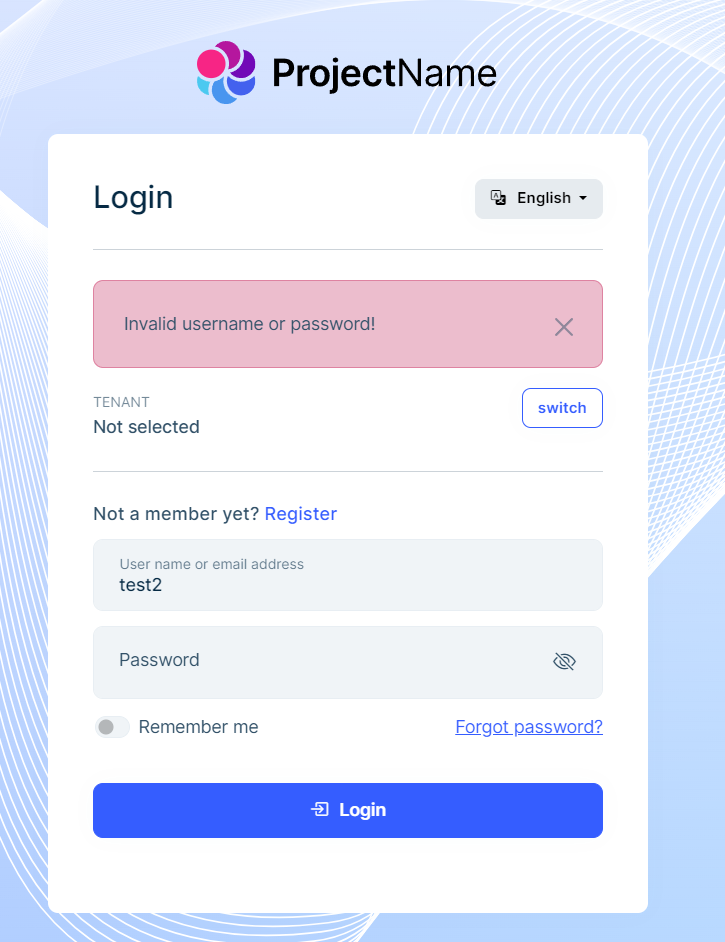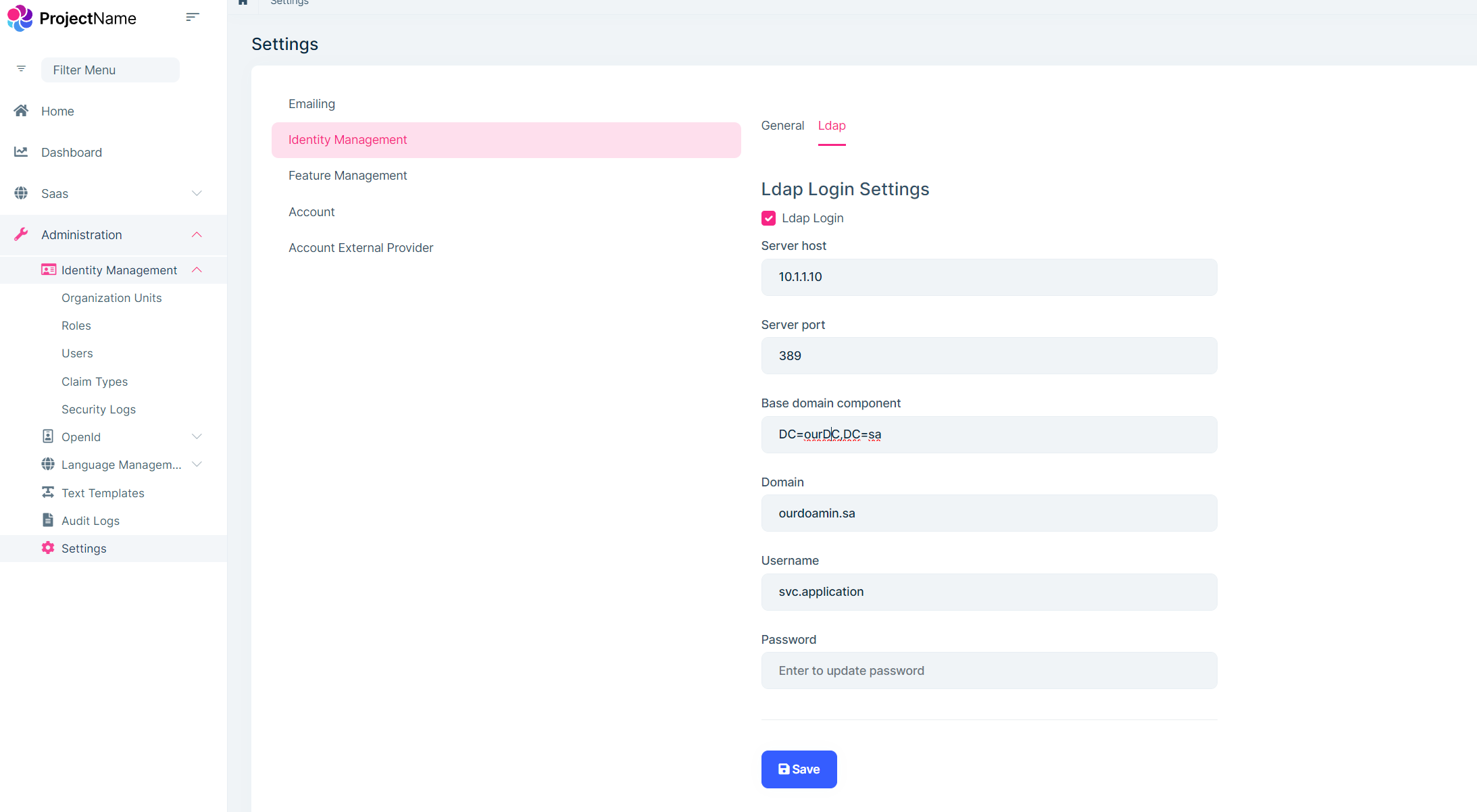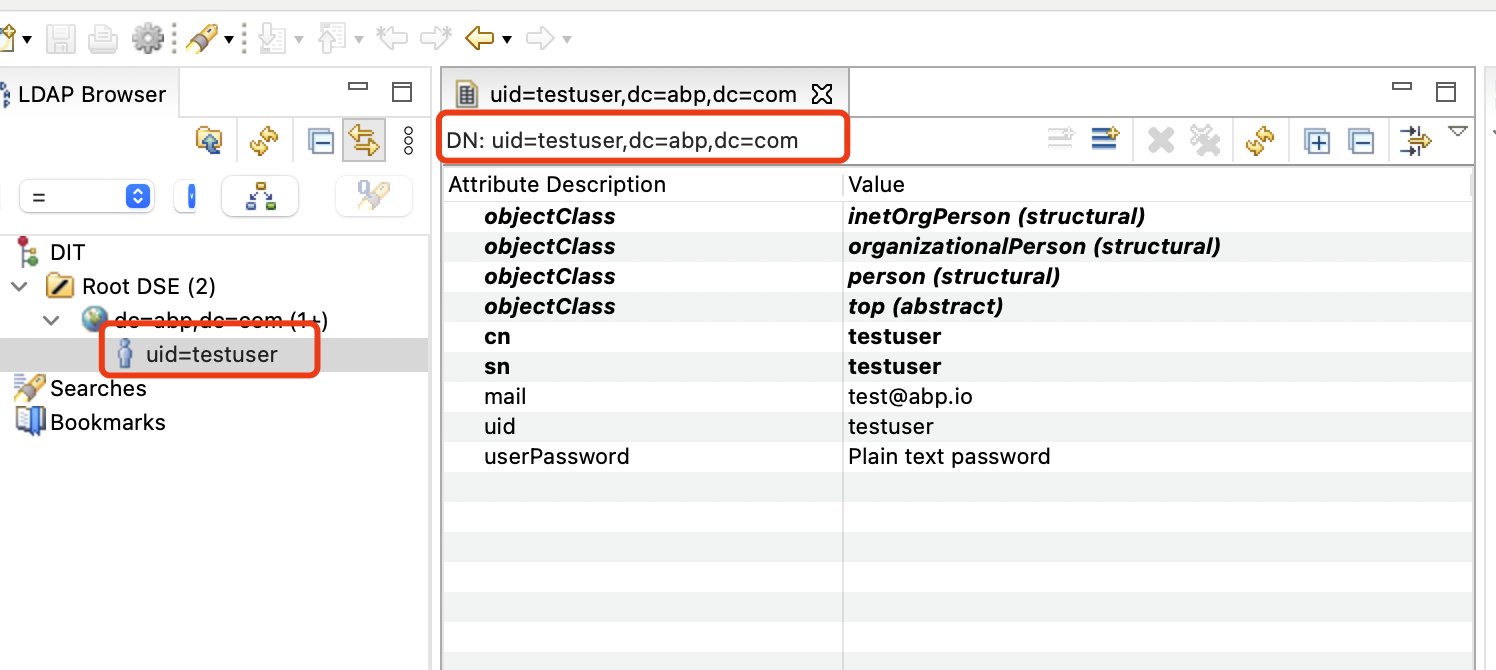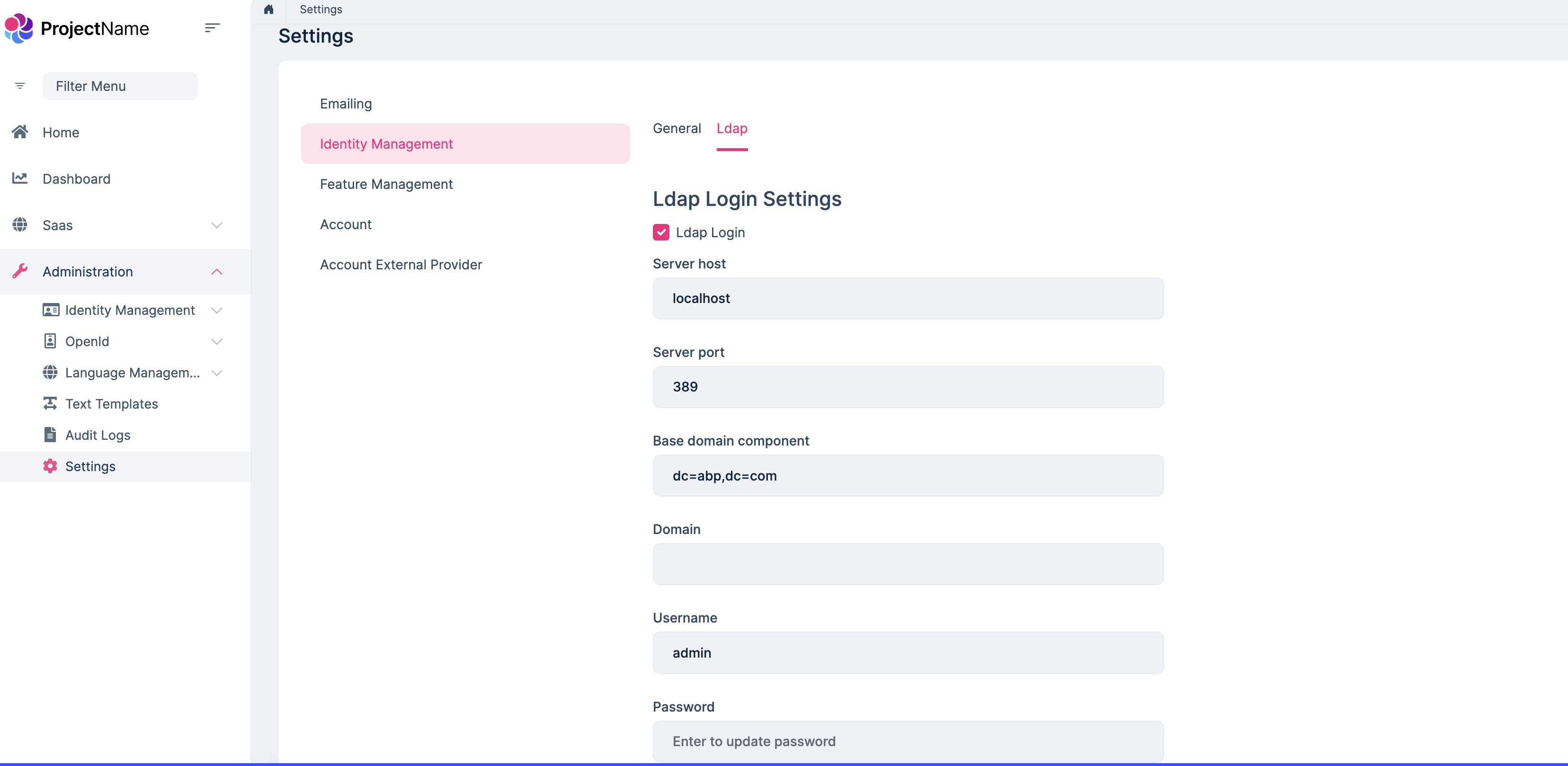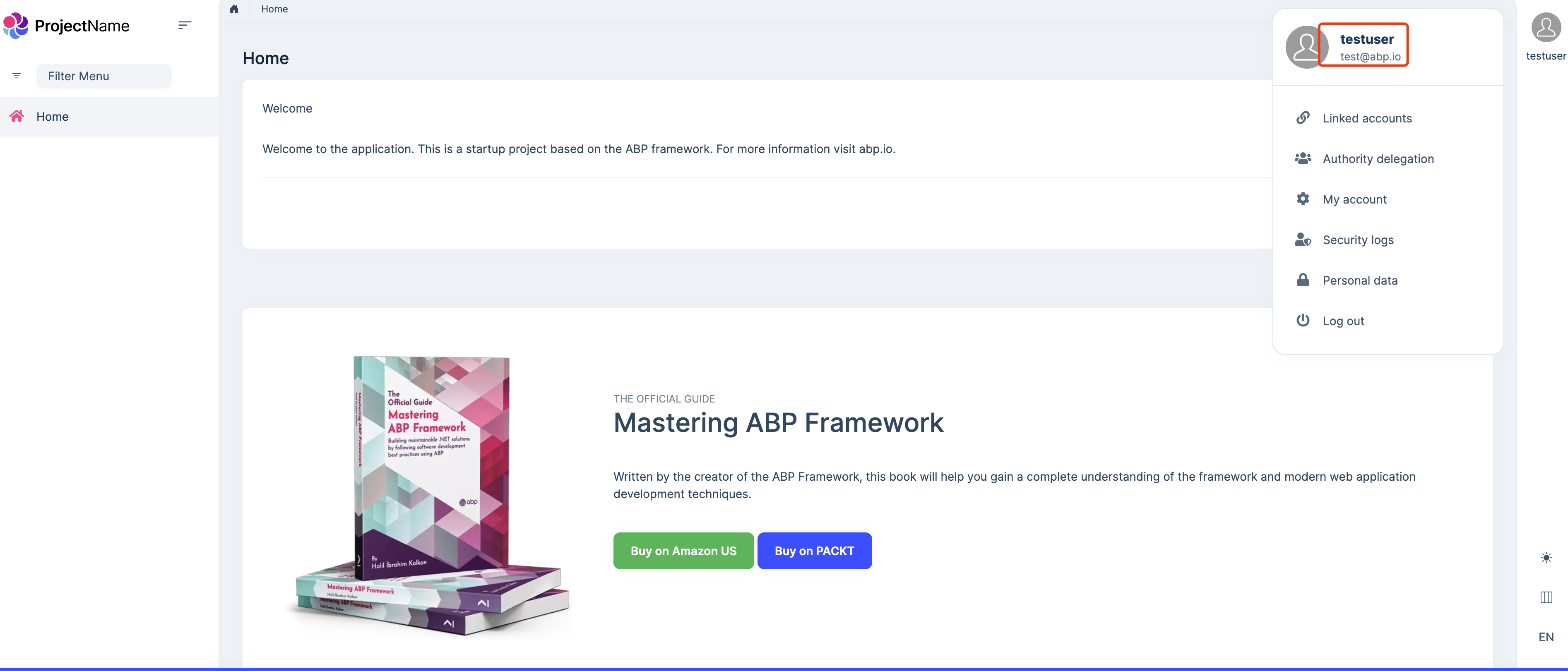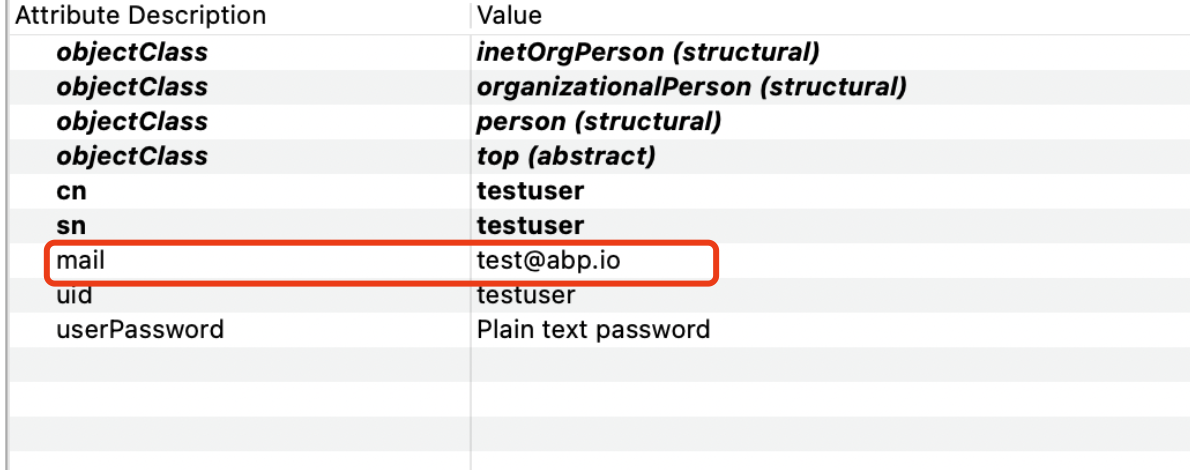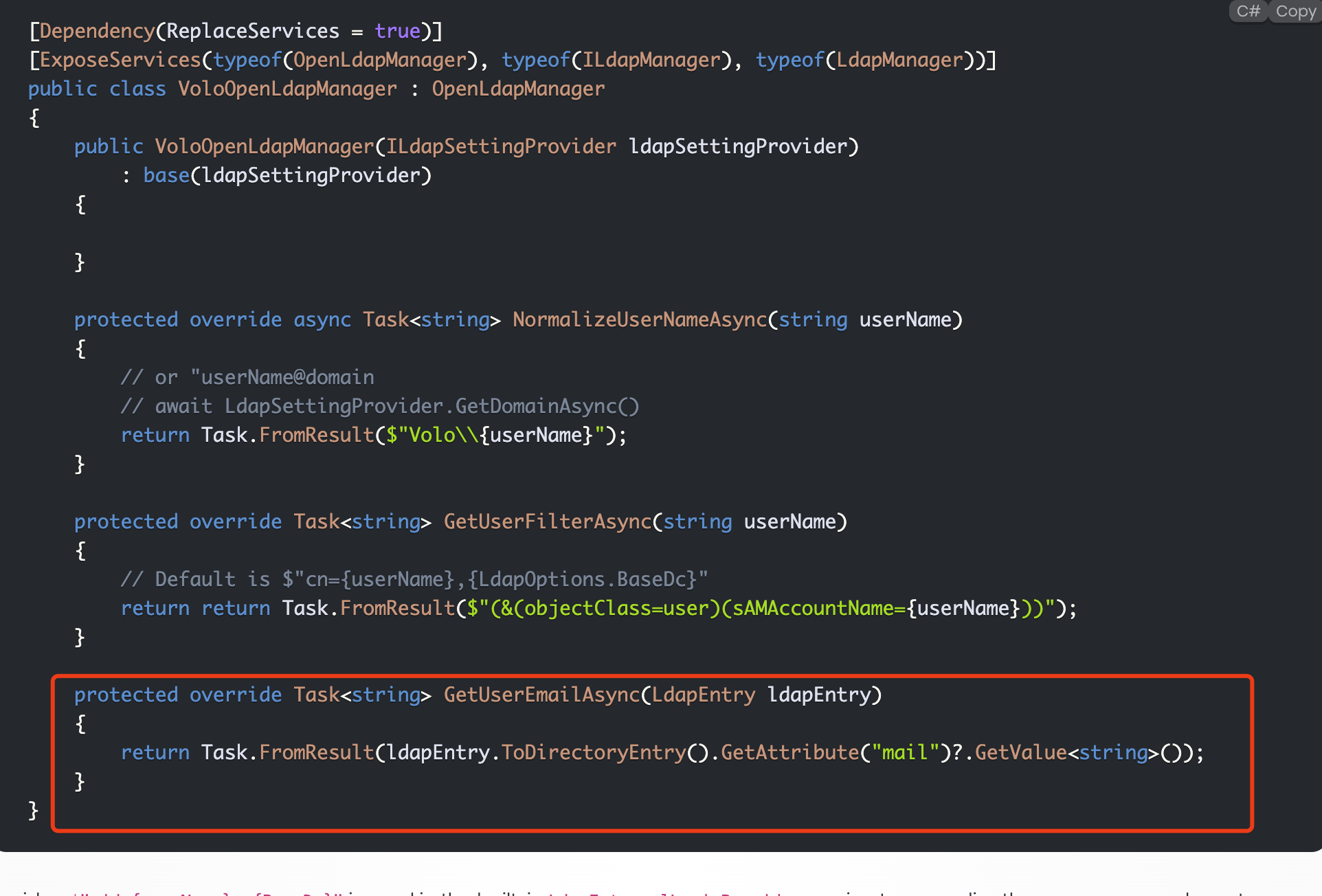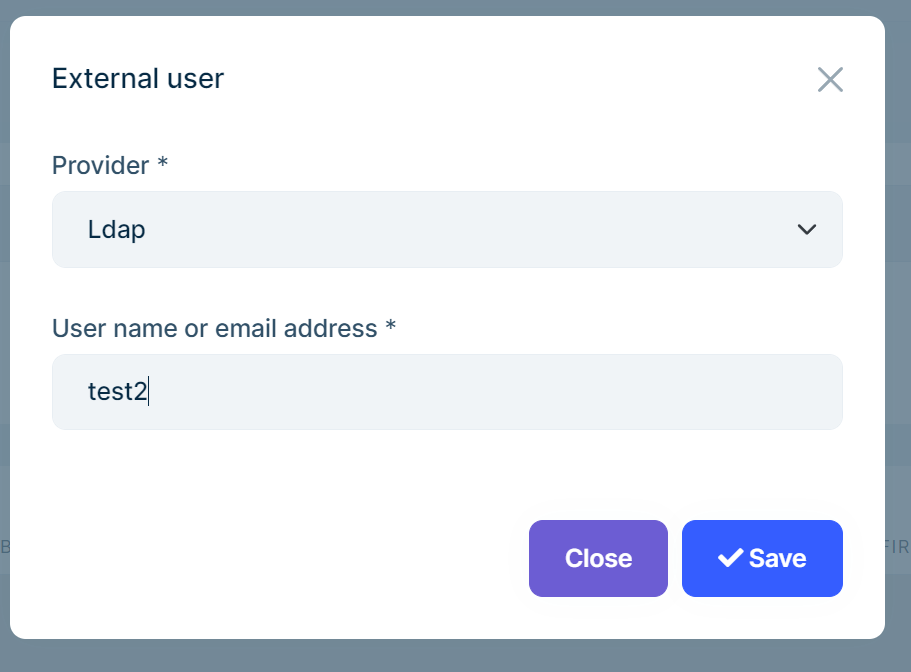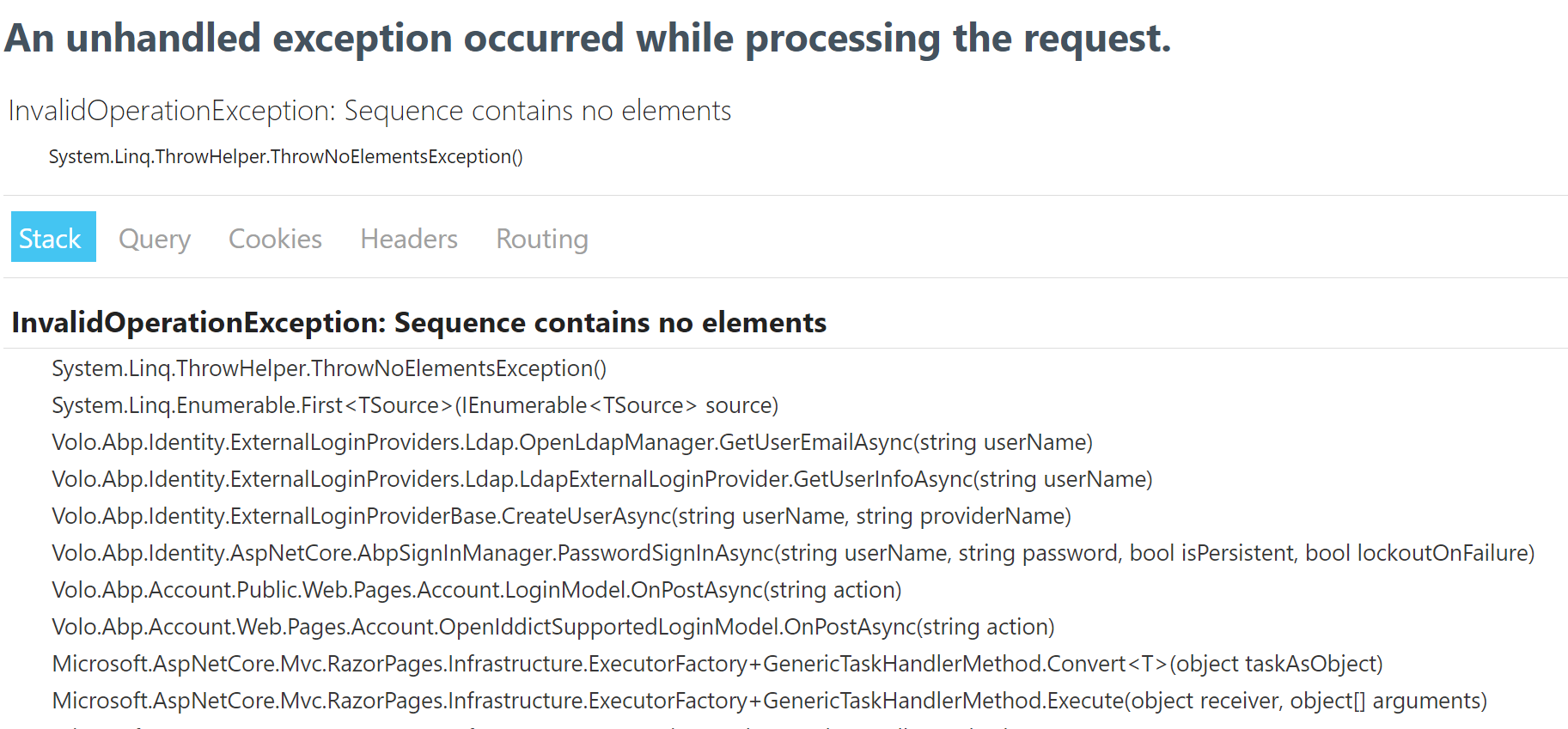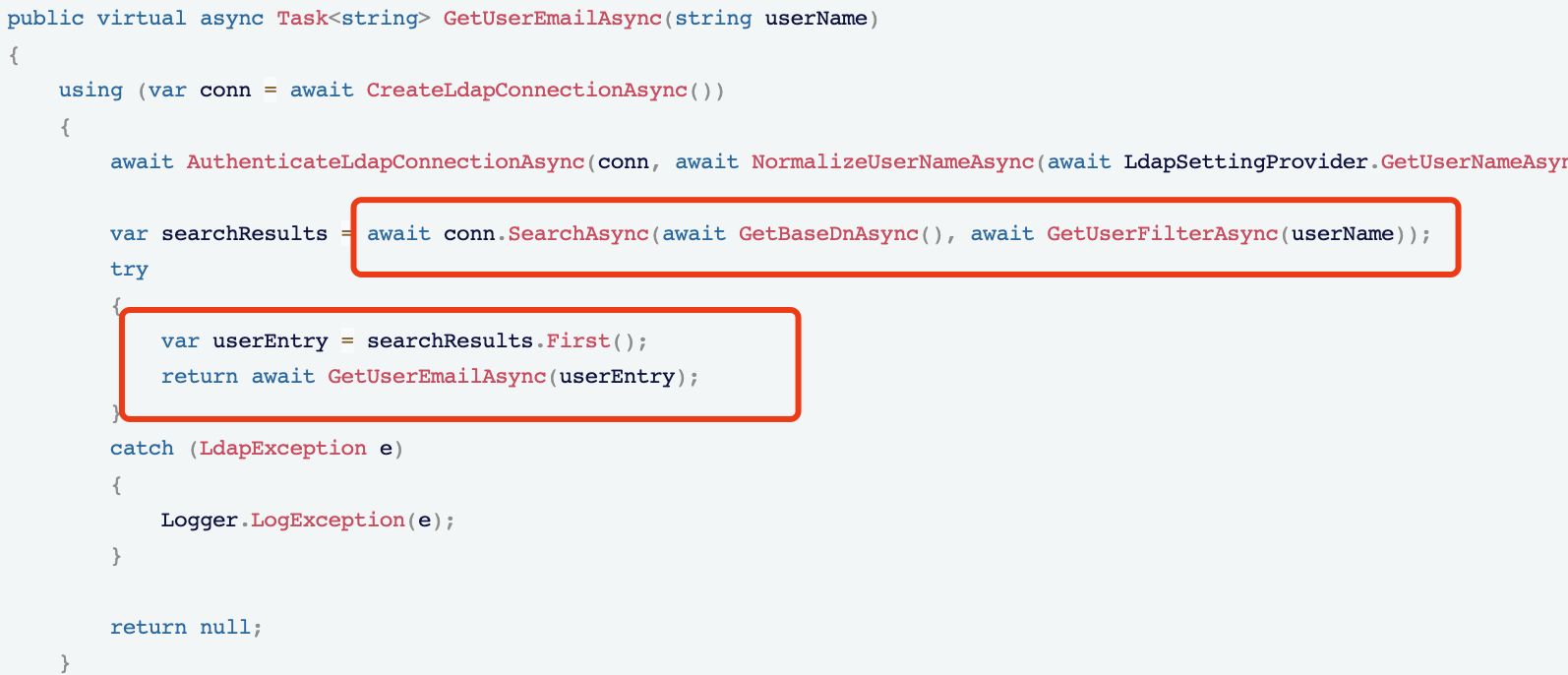Check the docs before asking a question: https://docs.abp.io/en/commercial/latest/ Check the samples to see the basic tasks: https://docs.abp.io/en/commercial/latest/samples/index The exact solution to your question may have been answered before, and please first use the search on the homepage. Provide us with the following info:
- ABP Framework version: v7.3.0
- UI Type: Angular / MVC
- Database System: EF Core (SQL Server)
- Tiered (for MVC) or Auth Server Separated (for Angular): No
- Exception message and full stack trace:
- Steps to reproduce the issue:
I am trying to integrate my Angular Application (Created using ABP Suite) with my enterprise Active Directory as an Authentication mechanism using LDAP UI . However, I keep getting "Invalid Username/Password"
19 Answer(s)
-
0
Hi,
We have an example to help you to check LDAP settings:
https://github.com/abpframework/abp-samples/tree/master/AbpLdapSample
-
0
I tried AbpLdapSample and its working. However, I still have issue with my App as I mentioned earlier
-
0
Hi,
Could you share the application logs? thanks.
-
0
this is the log
[10:13:48 INF] Executing endpoint '/Account/Login' [10:13:48 INF] Route matched with {page = "/Account/Login", action = "", controller = "", area = ""}. Executing page /Account/Login [10:13:48 INF] Skipping the execution of current filter as its not the most effective filter implementing the policy Microsoft.AspNetCore.Mvc.ViewFeatures.IAntiforgeryPolicy [10:13:48 INF] Executing handler method Volo.Abp.Account.Public.Web.Pages.Account.LoginModel.OnPostAsync - ModelState is Valid [10:13:48 INF] Try to use LDAP for external authentication [10:13:48 ERR] Invalid Credentials. Invalid Credentials. Result: 49. Method: ldap_parse_result. Details: errorMessage: 80090308: LdapErr: DSID-0C090439, comment: AcceptSecurityContext error, data 52e, v4563 matchedMessage: LdapForNet.LdapInvalidCredentialsException: Invalid Credentials. Invalid Credentials. Result: 49. Method: ldap_parse_result. Details: errorMessage: 80090308: LdapErr: DSID-0C090439, comment: AcceptSecurityContext error, data 52e, v4563 matchedMessage: at LdapForNet.Native.LdapNative.ThrowIfError(SafeHandle ld, Int32 res, String method, IDictionary`2 details) at LdapForNet.LdapConnection.ThrowIfParseResultError(IntPtr msg) at LdapForNet.LdapConnection.BindAsync(LdapAuthType authType, LdapCredential ldapCredential) at Volo.Abp.Ldap.LdapManager.AuthenticateLdapConnectionAsync(ILdapConnection connection, String username, String password) at Volo.Abp.Ldap.LdapManager.AuthenticateAsync(String username, String password)
-
0
I will check it
-
0
-
0
I followed what you did and it works fine. I noticed that you are using
filter="(&(uid=testuser))
I don't have uid in my AD
instead of using uid i would like to use sAMAccountName because I used it in the AbpLDAPSample
and it worked
so
how can I change filter="(&(uid=testuser)) to (&(objectClass=user)(sAMAccountName={testuser})
-
0
Hi,
You can check the document: https://docs.abp.io/en/commercial/latest/modules/identity/ldap#customize-built-in-services
-
0
I managed to integrate the AD and my App successfully but now I get this Exception when i try to login
Exception: Unable to get the email of ldap user!
-
0
-
0
-
0
I think it returns a null value.
This is the source code:
protected async override Task<ExternalLoginUserInfo> GetUserInfoAsync(string userName) { var email = await LdapManager.GetUserEmailAsync(userName); if (email.IsNullOrWhiteSpace()) { throw new Exception("Unable to get the email of ldap user!"); } return new ExternalLoginUserInfo(email); } ------------- [Dependency(ReplaceServices = true)] [ExposeServices(typeof(OpenLdapManager), typeof(ILdapManager), typeof(LdapManager))] public class OpenLdapManager : LdapManager { public OpenLdapManager(ILdapSettingProvider ldapSettingProvider) : base(ldapSettingProvider) { } public virtual async Task<string> GetUserEmailAsync(string userName) { using (var conn = await CreateLdapConnectionAsync()) { await AuthenticateLdapConnectionAsync(conn, await NormalizeUserNameAsync(await LdapSettingProvider.GetUserNameAsync()), await LdapSettingProvider.GetPasswordAsync()); var searchResults = await conn.SearchAsync(await GetBaseDnAsync(), await GetUserFilterAsync(userName)); try { var userEntry = searchResults.First(); return await GetUserEmailAsync(userEntry); } catch (LdapException e) { Logger.LogException(e); } return null; } } protected async override Task ConnectAsync(ILdapConnection ldapConnection) { ldapConnection.Connect(await LdapSettingProvider.GetServerHostAsync(), await LdapSettingProvider.GetServerPortAsync()); } protected virtual async Task<string> NormalizeUserNameAsync(string userName) { return $"cn={userName},{await LdapSettingProvider.GetBaseDcAsync()}"; } protected virtual Task<string> GetUserEmailAsync(LdapEntry ldapEntry) { return Task.FromResult(ldapEntry.ToDirectoryEntry().GetAttribute("mail")?.GetValue<string>()); } protected virtual async Task<string> GetBaseDnAsync() { return await LdapSettingProvider.GetBaseDcAsync(); } protected virtual Task<string> GetUserFilterAsync(string userName) { return Task.FromResult($"(&(uid={userName}))"); } } -
0
-
0
Hi,
Because it didn't find a user!
The search code logic is the same as the AbpLdapSample example:
https://github.com/abpframework/abp-samples/blob/master/AbpLdapSample/AbpLdapSample/Program.cs#L38
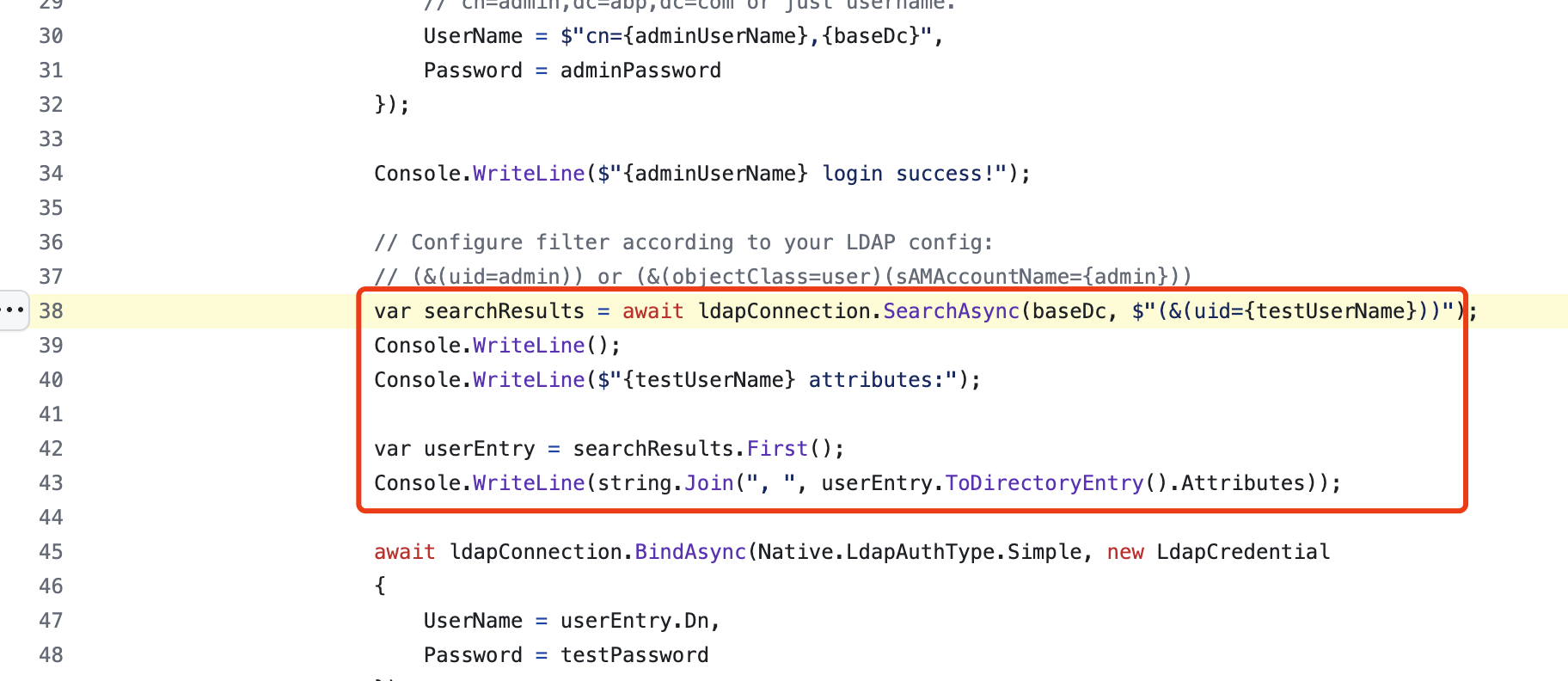
You can test your LDAP configuration through AbpLdapSample.
If it still doesn't work, can you share the LDAP configuration and test users with me? shiwei.liang@volosoft.com I'll check it.
-
0
its working on AbpLdapSamle
in my app some users successfully logged and some other users trigger the error above, they all have same attribute i don't know why some users can login and others cannot.
this user logged in successfully
this user cannot login and i get invalid username/password in login page


-
0
Hi,
How I reproduce the problem. could you share the full steps to reproduce? I will check it. thanks.
-
0
here is my code
using Microsoft.AspNetCore.Identity; using System.Threading.Tasks; using Volo.Abp.Features; using Volo.Abp.Guids; using Volo.Abp.Identity.ExternalLoginProviders.Ldap; using Volo.Abp.Identity; using Volo.Abp.Ldap; using Volo.Abp.MultiTenancy; using Volo.Abp.Settings; using Microsoft.Extensions.Options; using LdapForNet;
namespace TestApp.Web { public class VoloLdapExternalLoginProvider : LdapExternalLoginProvider { public VoloLdapExternalLoginProvider( IGuidGenerator guidGenerator, ICurrentTenant currentTenant, IdentityUserManager userManager, IIdentityUserRepository identityUserRepository, OpenLdapManager ldapManager, ILdapSettingProvider ldapSettingProvider, IFeatureChecker featureChecker, ISettingProvider settingProvider, IOptions<IdentityOptions> identityOptions) : base(guidGenerator, currentTenant, userManager, identityUserRepository, ldapManager, ldapSettingProvider, featureChecker, settingProvider, identityOptions) {
} protected override async Task<string> NormalizeUserNameAsync(string userName) { // Default is $"uid={userName}, {BaseDc}" // or "userName@domain //await LdapSettingProvider.GetDomainAsync(); var loginUserName= await Task.FromResult($"{userName}"); return loginUserName; } }}
using LdapForNet; using System.Threading.Tasks; using Volo.Abp.DependencyInjection; using Volo.Abp.Identity.ExternalLoginProviders.Ldap; using Volo.Abp.Ldap;
namespace TestApp.Web { [Dependency(ReplaceServices = true)] [ExposeServices(typeof(OpenLdapManager), typeof(ILdapManager), typeof(LdapManager))] public class VoloOpenLdapManager : OpenLdapManager { public VoloOpenLdapManager(ILdapSettingProvider ldapSettingProvider) : base(ldapSettingProvider) {
} protected override async Task<string> NormalizeUserNameAsync(string userName) { // or "userName@domain //await LdapSettingProvider.GetDomainAsync(); return await Task.FromResult($"{userName}"); } protected override Task<string> GetUserFilterAsync(string userName) { // Default is $"cn={userName},{LdapOptions.BaseDc}" return Task.FromResult($"(&(objectClass=user)(sAMAccountName={userName}))"); } protected override Task<string> GetUserEmailAsync(LdapEntry ldapEntry) { return Task.FromResult(ldapEntry.ToDirectoryEntry().GetAttribute("mail")?.GetValue<string>()); } }}
-
0
Hi,
Please share the full steps include the LDAP server Information(users etc..)
-
0






























































